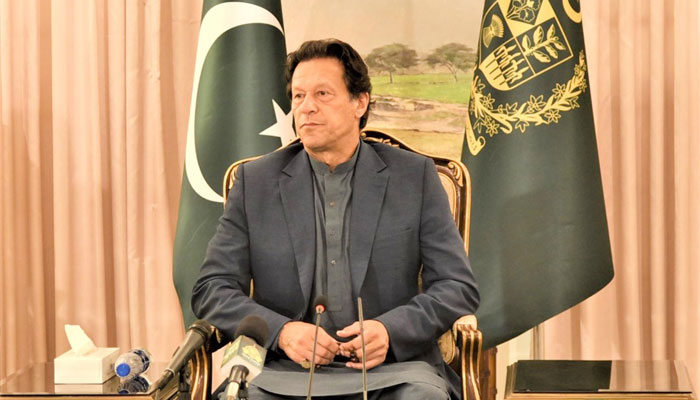Construction sector to open from 14th: Govt help for poor from today
PM Imran Khan said the government's biggest challenge is how to take care of poor people, therefore unprecedented Ehsaas Cash Disbursement Programme is being launched from Thursday
ISLAMABAD: Prime Minister Imran Khan on Wednesday cautioned that coronavirus was not going away any time soon and that people must strictly follow precautionary measures, as ‘laxity’ could be very dangerous, leading to spike in virus cases.
Speaking at a media briefing after chairing the National Coordination Committee (NCC) meeting here, he said they had reports that people in many areas were not caring about the virus, as if it would not harm them for they had a strong immunity system. “Such thinking is very dangerous, and don’t misconstrue the pandemic, as it will spread very fast, if precautions are not observed,” he warned.
He maintained that the virus would not go way in two or three weeks but would continue for quite some time and the country did not have the resources to deal with the pandemic on a larger scale. He also emphasised that the government had concerns that the way it was spreading, towards the end of April, hospitals might run short of space.
He also mentioned those believing that it would not make any difference if out of one hundred virus patients, one died and this was a very dangerous approach. He pointed out that the virus would spread rapidly at the crowded places. He said people need to understand one thing that the government was constantly focusing on how to combat the virus and wanted them to strictly adhere to precautions, as the government could not force people or use police to baton charge, ensuring social distancing.
“If we adopt precautions, we can save ourselves from its worst impact, as it is in our own hands. 85 per cent of those, who will be affected by the virus, will be fine at home while four to five per cent will need treatment at hospitals. And as per statistics, out of 100, one or one and a half can die,” he said. Imran noted that an infected youth could risk the life of his elders at home or those who were already sick.
“For God’s sake, don’t take it lightly, if this thinking persists, then it will spread very fast and even if four or five per cent virus cases will have to go to hospitals for treatment, their number will be so large that hospitals might not be able to provide ventilators and other emergency care to all of them,” he said.
However, he maintained that if the virus did not spread fast, then there would be space in hospitals for the infected patients. The prime minister again emphasized that the entire nation would have to fight the pandemic adopting precautionary steps, as no government alone anywhere could not fight it successfully on its own.
He said unlike the United States and Europe, the lockdown in Pakistan was quite different, as there were around 50 million people who live below the poverty line and then daily wagers, vendors and labourers and shopkeepers, who were affected by the lockdown.
The government, he continued, was trying to strike a balance between the lockdown and avoiding the spread of the virus and that this should not affect much the weak segments of the society.
The government went for lockdown in cities and was receiving reports that poor people, including daily wagers, labourers and vendors and shopkeepers, were now in bad shape. That was why, he pointed out, the government had decided to open the construction sector from April 14 while the agriculture sector was already open, exempted from the lockdown.
“Our biggest challenge is how to take care of our poor people and that is why unprecedented Ehsaas Cash Disbursement Programme is being launched from Thursday in which money will be directly transferred to people in 17,000 areas in the country. Some 12 million families will benefit from the programme,” he said. Rs144 billion would be disbursed in two to two and a half weeks.
The prime minister said the process would be transparent and free of political meddling or consideration, based on merit and automated system. “There can be no question of political affiliation and we want all legislators to get involved in the relief activities,” he said. Besides the cash programme, he said the PM Corona Relief Fund could also be utilised for this purpose.
The prime minister urged people to get themselves registered with the Corona Tigers Relief Force, which would have two main purposes: to help identify people, who are desperately in need of help and identify people, who need to be put under quarantine.
The force, he explained, would try to find out about people who were unable to register through SMS for cash disbursement programme, which people have received assistance, which people need assistance.
He again said the lockdown would only succeed if people were provided with food on their doorsteps and the relief force would be a vital part of doing that.
He said 3.5 crore people had applied for cash assistance. The prime minister contended that Pakistan did not have resources like the US, Japan, China or European countries and sought more cooperation from people to fight the virus and its impacts.
Minister for Planning and Development Asad Umar said there were many Pakistanis abroad, who had gone with visa and it was no more valid or those, who lost their job and now wanted to return to the country.
The minister explained that a plan was initially made to bring people back over the course of a week and it was confined to the Islamabad International Airport only. “And there were some issues, which were addressed duly. The matter was discussed in the National Coordination Committee and it was agreed that other airports in the provinces have to be included in this process,” he said.
Asad said a system was being developed so that they could arrive and at the same time no danger was posed from their arrival and they underwent due process to ensure they were not affected by the virus.
He said from next week, the operation would begin at the airports in other provinces. Special Assistant to the Prime Minister on Social Protection and Poverty Alleviation Dr Sania Nishtar said the government had received over 30.5 million SMSes for financial assistance under the Ehsaas Emergency Cash Programme.
She said 12 million deserving families would be given Rs12,000 each after biometric verification. Dr Sania Nishtar said Ehsaas Emergency Cash Programme was countrywide umbrella, and all provinces, including the Federation, Gilgit-Baltistan and Azad Jammu and Kashmir, were part of this initiative.
She called on people to contact toll-free helpline number 0800-26477 for any query in this connection. NDMA Chairman Lt Gen. Muhammad Afzal said Personal Protective Equipment (PPE) would be sent to all the provincial hospitals in the next three days, adding that at present, 22 laboratories were functional across the country, while equipment for establishing 12 more laboratories had been dispatched to the provinces.
He said 100,000 testing kits would arrive in Pakistan Wednesday night, out of which 35,000 kits would be given to Sindh, 15,000 to Balochistan, and 25,000 each to Punjab and Khyber Pakhtunkhwa. He explained that 2,35,000 more testing kits would be imported on Friday. He also threw light on other related measures and activities, being carried out by the authority.
-
 Tropical Cyclone Horacio Becomes World’s First Category 5 Superstorm Of 2026: Latest Forecast & Risks Explained
Tropical Cyclone Horacio Becomes World’s First Category 5 Superstorm Of 2026: Latest Forecast & Risks Explained -
 Hilary Duff Recalls Brutal Thing She Did To Husband Matthew Koma After Losing Their Home In Los Angeles Wildfire
Hilary Duff Recalls Brutal Thing She Did To Husband Matthew Koma After Losing Their Home In Los Angeles Wildfire -
 Princess Beatrice, Edo Mapelli Mozzi Fall Into Marital Woes: ‘He Doesn’t Want Her Seen With Andrew’
Princess Beatrice, Edo Mapelli Mozzi Fall Into Marital Woes: ‘He Doesn’t Want Her Seen With Andrew’ -
 Meta’s Internal Memo Reveals How Executives Ignore Safety Warnings To Push Messenger Encryption Rollout Despite Risks To Teen Safety
Meta’s Internal Memo Reveals How Executives Ignore Safety Warnings To Push Messenger Encryption Rollout Despite Risks To Teen Safety -
 Robert Carradine's Shocking Suicide Answer 'lies' In Brother David Old Tragic Incident
Robert Carradine's Shocking Suicide Answer 'lies' In Brother David Old Tragic Incident -
 'CIA' Star Tom Ellis Drops Bombshell Reason Why He Stayed Away From 'FBI': I Know What They Do'
'CIA' Star Tom Ellis Drops Bombshell Reason Why He Stayed Away From 'FBI': I Know What They Do' -
 Biographer Calls Andrew National Security Risk: ‘This Huge Can Of Worms Is Getting Closer To King’
Biographer Calls Andrew National Security Risk: ‘This Huge Can Of Worms Is Getting Closer To King’ -
 DeepSeek Under Fire: Anthropic Accuses Chinese AI Firm Of Misusing Claude For Unauthorized Model Training
DeepSeek Under Fire: Anthropic Accuses Chinese AI Firm Of Misusing Claude For Unauthorized Model Training -
 Would You Drive In A Driverless Taxi? AI-powered Robotaxis Roll Out In London Amid Growing Debates Over Road Safety, Passenger Convenience
Would You Drive In A Driverless Taxi? AI-powered Robotaxis Roll Out In London Amid Growing Debates Over Road Safety, Passenger Convenience -
 Trump’s Tariff Plan: 10 Percent Rate Takes Effect Despite 15 Percent Announcement Following Supreme Court Ruling
Trump’s Tariff Plan: 10 Percent Rate Takes Effect Despite 15 Percent Announcement Following Supreme Court Ruling -
 Eric Church Reveals How Vince Gill Made His Brother Barndon's Death 'a New Normal'
Eric Church Reveals How Vince Gill Made His Brother Barndon's Death 'a New Normal' -
 Harry, Meghan Offer Help To Beatrice, Eugenie As They Navigate Big Decision
Harry, Meghan Offer Help To Beatrice, Eugenie As They Navigate Big Decision -
 Robert Carradine's Heartbroken Brother Keith Breaks Silence On Actor's Tragic Death
Robert Carradine's Heartbroken Brother Keith Breaks Silence On Actor's Tragic Death -
 How Deepfake Scams Are Reaching Record Levels By Targeting Social Media Users: Everything You Need To Know
How Deepfake Scams Are Reaching Record Levels By Targeting Social Media Users: Everything You Need To Know -
 Taylor Swift Embraces Herself As Her Career Hits Major Milestone: 'I Am Blown Away'
Taylor Swift Embraces Herself As Her Career Hits Major Milestone: 'I Am Blown Away' -
 Andrew’s Arrest Takes Over US Elites: ‘They’re Calling Lawyers In Fear The Police Will Pounce’
Andrew’s Arrest Takes Over US Elites: ‘They’re Calling Lawyers In Fear The Police Will Pounce’




